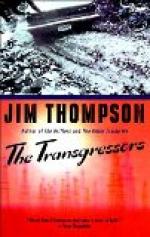The monopoly of the cable is obtainable by an easy means. All four of the lines which communicated with the United States are leased. Messages rumoring important developments in the China alliance question are transmitted and suffice to explain the cessation of other news—the Government is supposed to be using the cables.
Despite the efforts of the speculators, an enterprising correspondent of a New York News Association succeeds in sending the news of the bond issue announcement, so that it is received on ’Change at two o’clock. From another source the message of death is cabled fifteen minutes before the closing of the market.
Golding and Nevins lunch together before starting for Paris.
“I have closed a deal to-day that will net me twenty-five million dollars within six weeks,” Golding confides to Nevins with an air of satisfaction. He might be a retail merchant discussing trade with a neighbor and relating the result of a barter which will net him a profit of a hundred dollars, for there is no stronger emotion in his speech or manner than would be evoked by such a commonplace transaction. Yet this man has just arranged a financial deal which is to maintain the stability of the currency of a Nation of a hundred millions of people.
“Then it is true that you are to shoulder the responsibility of disposing of the United States bond issue?” Nevins inquires with a semblance of interest. “What would that Republic do if it were not for its public spirited men of wealth? Republics are all right when they are curbed by the conservative elements, but when the riff-raff gets the reins in hand, then there is always trouble.”
“The days of mob rule in America are over,” Golding declares. “It was no easy matter to wean the people of the fallacious idea that a proletariat could manage the finances of the country.”
“When our mine is in operation you will not have to seek the aid of England in taking bonds off the hands of the Treasurer of the United States, will we?” Nevins asks.
“That’s just the point,” exclaims Golding. They talk on in this strain until the meal is finished.
“We have ten minutes to get to the terminal,” says Nevins, consulting his watch.
“O, that will be ample time. It only takes five minutes to ride there.”
When the train is reached, Golding looks at his watch. “There, I told you we could make it in five minutes. I am always just on time. Never a minute too soon or a minute too late. Time is money. Perhaps I am the wealthiest man in America, if not in the world, because I know the value of time.”
“That certainly is the secret of your success,” Nevins declares blandly.
The Special Paris Express is composed of six coaches and the motor; this train runs at an average speed of sixty-two miles an hour. It is the fastest train on the continent. So that they may not be disturbed, the mine promoters have arranged to occupy a private car attached to the rear of the train. This car they enter. Nevins carries a small hand-satchel which he declines to give over to the willing porter.




